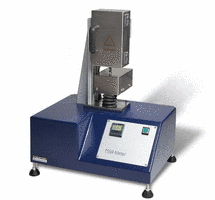Anisothermal stress relaxation test for characterizing elastomers and polymers
The Brabender® TSSR meter (TSSR = Temperature Scanning Stress Relaxation) measures the thermo-mechanical properties of elastomers and polymers subjected to a constant stress at a constantly rising temperature.
The measuring data supply reliable information about the phase morphology of the material tested. Apart from that, this instrument allows to assess the modification of polymers with various additives and to determine the properties of such modified substances.
The method
The anisothermal stress relaxation test (AISR) is a new test method for characterizing the thermo-mechanical properties of elastomers and polymers. It consists in subjecting a test specimen to a constant tensile stress at a constantly rising temperature. The stress relaxation is measured as a function of time and is recorded and evaluated.
The AISR test method, originally developed for determining the upper service temperature and relaxation spectrum of thermoplastic elastomers (TPE), has proven to be perfectly suited for testing conventional elastomers and polymers as well.
In contrast to conventional relaxation tests carried out at a constant temperature, the temperature in the AISR test rises continuously at a defined heating rate, allowing the determination of the max. service temperature and relaxation spectrum of the sample material.
Contact person
This instrument is distributed by our sister company Brabender Messtechnik®.
Please contact:
Publications
/1/ N. Vennemann, J. Hündorf, C. Kummerlöwe und P. Schulz, "Phasenmorphologie und Relaxationsverhalten von SEBS/PP-Blends." Kautschuk Gummi Kunststoffe 54 (2001) 362 – 367
/2/ N. Vennemann, „Praxisgerechte Prüfung von TPE“ Kautschuk Gummi Kunststoffe (2003) pp. 242
/3/ Ch. G. Reid, K.G. Cai, H. Tran und N. Vennemann, “Polyolefin TPV for Automotive Interior Applications” Kautschuk Gummi Kunststoffe (2004) pp. 227 – 234
/4/ A. Barbe, K. Bökamp, C. Kummerlöwe, H. Sollmann, N. Vennemann und S. Vinzelberg, „Investigation of Modified SEBS-Based Thermoplastic Elastomers by Temperature Scanning Stress Relaxation Measurements”. Polym. Eng. and Science (2005) pp. 1498 – 1507
/5/ N. Srinivasan, K. Bökamp und N. Vennemann, “New Test Method for the Characterisation of Filled Elastomers”. Kautsch. Gummi Kunstst. (2005) pp. 650 - 655
